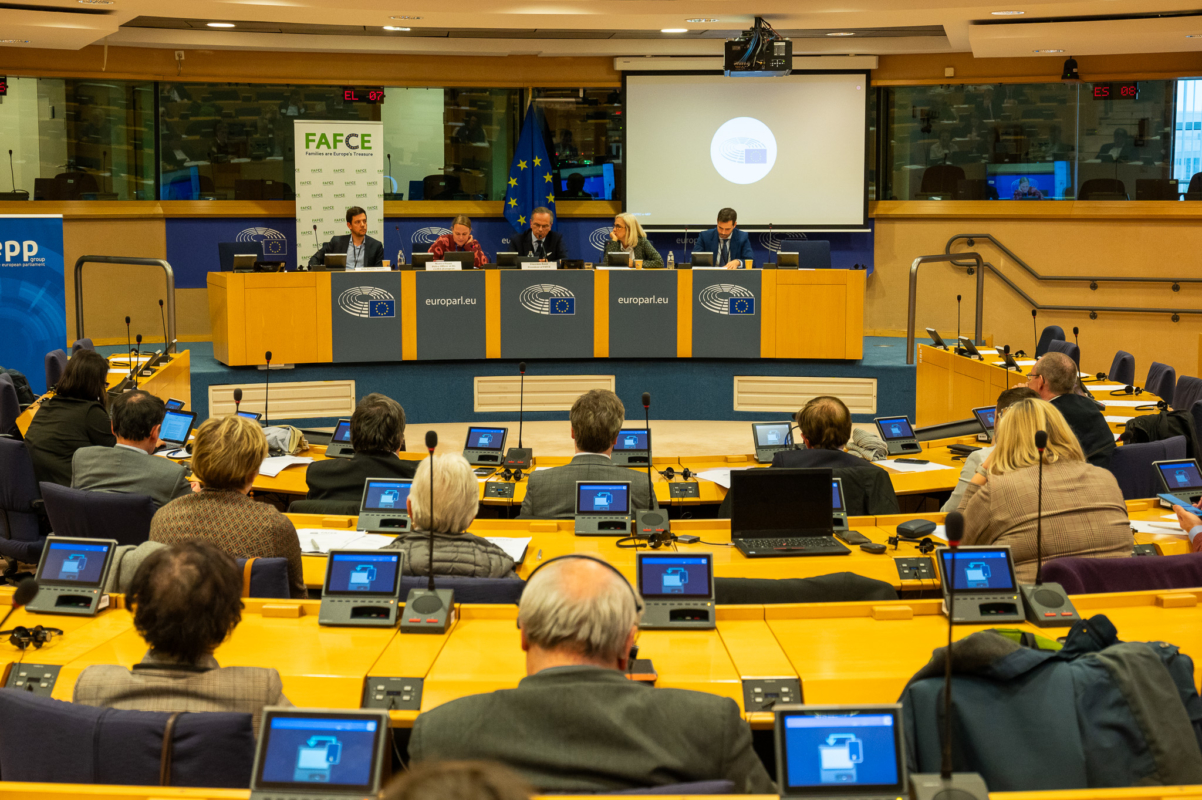Brussels, 7th November 2024
FAFCE Autumn Board Resolution 2024
Families are an investment, not a cost
The Board of the Federation of Catholic Family Associations in Europe (FAFCE), gathered this week in Brussels for its Autumn meeting issued the following Resolution:
In the context of the election of the European Commission, the Federation of Catholic Family Associations in Europe (FAFCE) wishes to underline the need for practical actions to tackle the Demographic challenges that are weakening the social and economic environment of European societies. Families are at the core of the solution to this problem, being the basic source of human and social capital.
Meeting the challenges of tomorrow requires us to act today. The European institutions can play a seismic role in establishing a sustainability that – not only addresses our current crises – but builds a stability for our children and generations to come.
The continent is still plagued by war, breakdown of families, decreasing fertility rates, a pandemic of loneliness, and challenges of ageing society. The continent is also in a spiritual crisis, especially visible in the declining hope for the future. It is the lived experience of Europe that, in places troubled by conflict, networks of families are the architects of peace. In times of isolation, networks of families try to build understanding and harmony. In the face of division, networks of families provide intergenerational solidarity. It is in the family that this hope is found, since there is no future without the family, which “is the first school of the social virtues that every society needs”.
Recalling FAFCE 2017 20th Anniversary Declaration Families are Europe’s Treasure and building block for the future “the current demographic situation in Europe with an ageing population, falling birth rates in a majority of countries, and declining fertility, that illustrates the lack of confidence in the future and generates frustration and disappointment”;
Considering the 2023 Demographic toolbox published by the European Commission calling on EU Member States “to put in place and implement integrated policies” in order to address the challenge of Europe’s demographic winter, and “mainstream demography concerns across all policies”;
Bearing in mind the Speech of Ursula von der Leyen: “Families are feeling the pain from the cost of living and housing.”;
Taking note that there is now a Commissioner in charge of Intergenerational Fairness;
Considering the article 174 of the Treaty on the Functioning of the European Union (TFEU) “demographic handicaps” should receive a particular attention by the EU in order to promote its overall harmonious development;
Considering that the National Plans for Recovery and Resilience have to cover six policy areas (namely green transition; digital transformation; smart, sustainable and inclusive growth; social and territorial cohesion; health; policies for the next generation);
Our Federation:
- Welcomes the fact that regional and cohesion policy are given a prominent place in the College of Commissioners;
- Expresses its concern about the fact that the name of “Commissioner for Demography” has disappeared from the title of European Commissioner for the Mediterranean;
- Recalls the difference between social policies and demographic investments;
- Asks to consider family and demographic policies as investments rather than financial costs;
- Asks not to count demographic investments for the 3% of budget equilibrium;
- Asks to include family policies in the National Recovery Plan for Next generations, as it is a way to allow families to see the future without burden. Taking the example of the inclusion of ecology, where at least 37% of the national plans have to be attributed to climate or biodiversity, this shall be required also for demographic policies; Asks the European Commission to create a new Directorate-General for demography and regional development, prioritising cohesion funds for regional needs, such as regions where the birth rate is below the national average;
- Believes that cohesion policy should play a more critical role in this respect, calling to the European Parliament to mainstream demographic considerations across all policy areas and include budget headings with a view to enabling the further development of these policies. More use could be made of the European Regional Development Fund, the European Social Fund and the European Social Inclusion funds in general to tackle demographic challenges; Social inclusion policies are focused only on labour market but should also include demographic issues and their consequences on the new generations;
- Believes that cohesion policies should also take into account the lack of younger workers who keep a region active, considering that young workers and young families should be helped to stay in a region where demographic imbalances are high. The Rural Development fund and the Just Transition fund should particularly address the question of families
- Calls to the European Commission to consider family and demographic policies as investments in the human capital and not as social expenses that increase the public debt; Family policy is an investment to optimise the possibility for families to thrive and to prevent future expenses for social policies. Thriving families also mean the improvement of the demographic condition of society.
- Invites the EU Commission to organise a high-level and intergovernmental event on “Demography: the rethinking of the “Maastricht criteria”, considering the inclusion;
- Supports the idea of creating an EU Agency for Demography to collect data and statistics about the needs and challenges faced by families;
- Supports the creation of a Demography Intergroup at the European Parliament
The EU should consider family policies as investments in the human capital and not expenditures.
European Agency for Demography:
During the last five years, the European Commission conducted a great work of raising awareness about demographic issues and alerted on the risks of the demographic winter.
This work should be promoted among national governments; the continuation of the Commission’s work must be ensured, with a special attention on providing the European Commission with the necessary financial and human resources to conduct a fruitful work.
In order to collect data and statistics related to family, the EU should create an EU Agency for Demography. Mindful of the national competences, FAFCE would like to invite the Union to exercise the power it has to draw a big picture of the needs and challenges faced by families, also taking into account the presence of grandparents and carers, who constitute essential factors in the protection, growth and unity of the families themselves.
When various measures to tackle demographic imbalances will be collected, it will be possible to rank the most effective measures by Member States through an Open Method of Cooperation.
The goal of creating a new agency is to help Member States to better understand demographic trends and to target the most vulnerable groups, in cooperation with the demands of civil society. A new agency should not be bureaucratic but act according to the needs of Member States and in cooperation with civil society.







